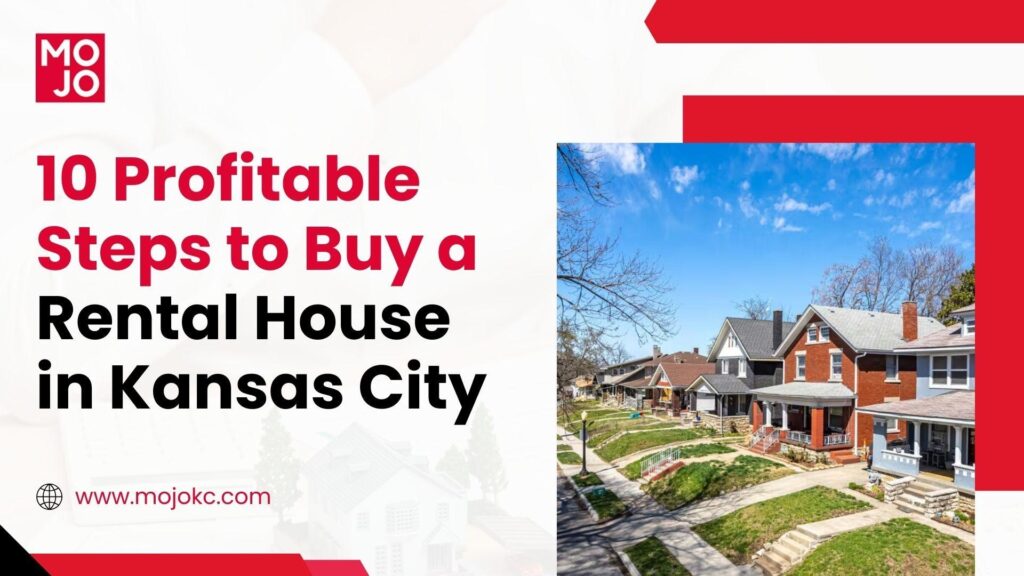
You may want to buy a rental house in Kansas City, but feel stuck. The housing market moves fast, and it is easy to feel lost in the many real estate listings. Bad choices can lead to high costs, vacancies, and tenant issues. This fear can stop you from starting. Many buyers wait too long and miss good deals. Others jump in too fast and end up with the wrong investment property in Kansas City.
This guide provides valuable insights on how to identify safe investment options and compare duplexes and townhomes effectively. It also emphasizes the importance of collaborating with a reputable realtor in Kansas City to establish a reliable source of rental income. So, if you want to buy a rental house in Kansas City, then this guide is for you.
- Study Local Market Trends
The first step is to study the local market and understand how rental values move each year in Kansas City. In 2025, the average rent is around $1,201 per month, which shows steady growth from the past years. According to Yardi Matrix, the multifamily market increased by about 3.1% year-over-year, with occupancy holding near 94.7%.
These numbers mean more demand for rental homes, making Kansas City a strong choice for investors in 2025. You should always compare different areas before making decisions. For example, Downtown Kansas City attracts younger renters who want access to jobs, nightlife, and transit.
Meanwhile, suburbs like Johnson County appeal to families who look for schools and parks. Both areas show demand, but they attract different tenants. If you watch these trends, you can pick locations that fit your rental goals.
Connect with the MoJo KC Team today and let trusted experts guide your rental property journey.
- Set a Clear Budget and Run the Numbers
A budget keeps you safe when buying. You should write down expected costs like down payment, repairs, property taxes, and insurance. Many new buyers forget closing costs or maintenance, but these items affect profit. A simple spreadsheet helps you see cash flow clearly and avoids surprises that lower income.
With the right numbers, you can focus only on properties that give positive returns. For example, a local buyer in Kansas City purchased a duplex at $240,000 with a $48,000 down payment. He expected $2,100 in monthly rent but found taxes and insurance took nearly $350 each month. After adding repairs, his net income dropped. Because he tracked these costs early, he adjusted his rent and still made a profit. You need to calculate the same way to protect your investment.
- Choose Good Neighborhoods with Growth
You must focus on neighborhoods where growth is strong and steady, since tenants want safety, schools, and nearby services. According to a 2025 Kansas City housing forecast, areas like Brookside, Waldo, and Overland Park keep attracting both renters and buyers.
When more people move in, demand rises, which means lower vacancies and higher rental income potential. A real example is Waldo, where new restaurants and shops opened recently. Families and young professionals rent homes here because the location is walkable and lively.
Johnson County also continues to grow as new businesses bring jobs, which increases housing needs. If you choose these spots, your rental house can stay occupied longer and bring more income. You should always study local data before making your final move.
- Find Properties with Potential (Duplexes and Townhomes)
When you want a stable income, duplexes and townhomes offer strong rental potential, since they attract tenants who want privacy. You also get more units under one roof, which helps spread costs and lowers risk when one unit sits empty.
With more renters per property, you can recover expenses faster and improve monthly profit. For example, a Kansas City investor bought a duplex for $260,000 and rented both units for $1,050 each. Even after paying taxes, insurance, and basic repairs, he earned a steady cash flow.
Smaller properties like townhomes also attract families and young professionals who want low-maintenance living. This type of property often stays rented longer, especially in growing neighborhoods with schools, shops, and transit nearby.
- Use a Good Realtor in Kansas City
A local realtor brings knowledge about pricing, zoning rules, and rental demand in different neighborhoods across Kansas City. They understand which areas have rising value and which ones carry higher risks for new buyers. Without this help, you may spend more or miss strong opportunities hidden within the market.
A real example is a family relocating from Texas who worked with a realtor in Kansas City. The agent guided them toward Overland Park, where vacancy rates were low and demand stayed strong. They found a rental property that fit their budget and generated positive cash flow from the first month. Working with an experienced professional saves time, avoids mistakes, and increases your confidence as an investor.
Ready to buy a rental house in Kansas City? Start your investment path with confidence now.
- Inspect Property and Plan Repairs
Before you buy a rental house in Kansas City, always walk through the house with a licensed inspector to check major systems like the roof, plumbing, and heating. Small issues can turn into expensive problems later if you ignore them during the buying process. Repairs eat into profit, so you need to know real numbers before making a final decision.
For instance, one investor found a rental house with strong rent potential but needed $12,000 in roof and HVAC work. Because he added these costs to his budget, he avoided financial shock after closing. If he ignored the inspection, his first year would bring losses instead of profit. Careful checks protect your money and keep your tenants safe at the same time.
- Estimate Ongoing Expenses and Taxes
In order to buy a rental house in Kansas City, it comes with expenses that reduce profit, so you must plan for taxes, insurance, repairs, and management fees. In Kansas City, property management companies often charge around 8–12% of the monthly rent for handling tenants and maintenance. These costs should be part of your plan from the beginning.
A 2025 housing report shows property taxes across Missouri rose slightly due to higher home values. Insurance premiums also increased because of weather-related claims. A landlord who rented in Brookside budgeted $250 monthly for these costs, which saved him from running short later. If you build an expense fund early, you can manage repairs and vacancies without stress.
- Verify Rental Demand and Vacancy Rates
Before you buy a rental house in Kansas City, check rental demand in the exact neighborhood where you plan to invest. If demand is low, tenants leave faster and vacancy periods grow longer. According to 2025 market reports, Kansas City multifamily properties showed a 5-6% vacancy rate, which signals strong demand.
A new landlord in Midtown checked the vacancy before buying and saw consistent rental activity. He purchased a home near schools and transit stops, which was rented within weeks. If he had ignored vacancy rates, his property could have sat empty for months. Always compare vacancy numbers to ensure your rental house can stay profitable.
Plan Financing and Cash Flow Carefully

Financing determines how much profit you make each month, so you must shop around for loans before signing. Lenders in 2025 offered average mortgage rates near 6.9%, which raised monthly payments and lowered returns for many buyers. Careful planning helps avoid surprises.
For example, an investor bought a Kansas City rental using a 30-year loan with 20% down. His monthly costs increased, but rent covered payments with room for profit. He reviewed his numbers first, so he avoided financial stress later. Always confirm that rental income covers mortgage, taxes, and expenses with an extra cushion.
- Manage the Property Well
Strong management keeps tenants happy, which reduces turnover and repairs. Respond quickly to problems and schedule regular maintenance checks. Happy tenants pay rent on time and stay longer, which increases your total income.
One landlord in Kansas City updated kitchens and improved landscaping in his duplex. Tenants renewed leases and agreed to small rent increases without complaint. This simple attention raised income and lowered vacancy periods. If you treat property management seriously, your investment property can remain profitable year after year.
To Wrap it Up
Buying a rental property is not only about finding the right house. It also means understanding the market, planning money, and keeping tenants satisfied. If you study local data, inspect carefully, and work with experts, you lower risks and increase profits. If you want to buy a rental house in Kansas City, these steps guide you from start to finish. With steady moves, you can grow your income and build long-term wealth.
Talk with a local realtor of the MoJo KC Team today. Take the first step, and your rental property investment can bring you steady returns in 2025 and beyond.
FAQs
1. Is Kansas a good place to invest in real estate?
Yes, Kansas offers affordable housing, steady job growth, and strong rental demand. Investors often find stable returns and lower entry costs compared to bigger states.
2. Is Kansas City a good place to buy rental property?
Kansas City has rising rents, steady population growth, and low vacancy rates. These factors make it attractive for anyone looking to build rental income.
3. Is it a good time to buy a house in Kansas City?
Yes, 2025 data shows demand remains strong, and prices are still reasonable compared to national averages. Acting now can secure long-term gains.
4. Is Kansas City currently profitable?
Reports show Kansas City rental properties average strong occupancy with rent growth above 3% this year. Investors continue to see steady positive returns.
5. What type of property works best in Kansas City?
Duplexes and townhomes often perform well because they attract long-term renters. They also spread costs and help investors balance risk effectively.
